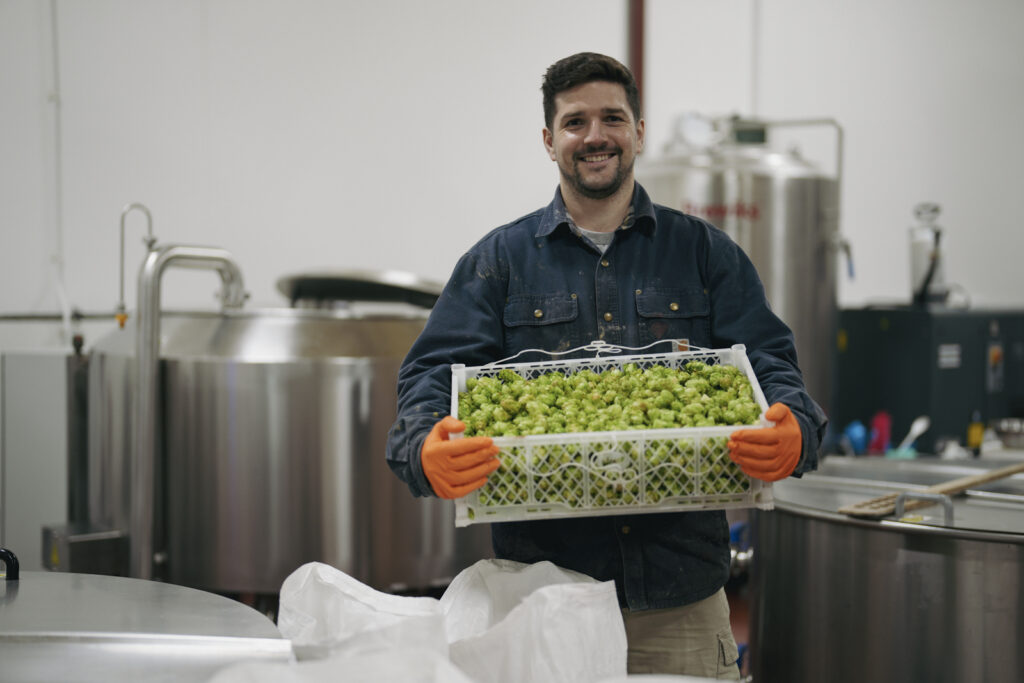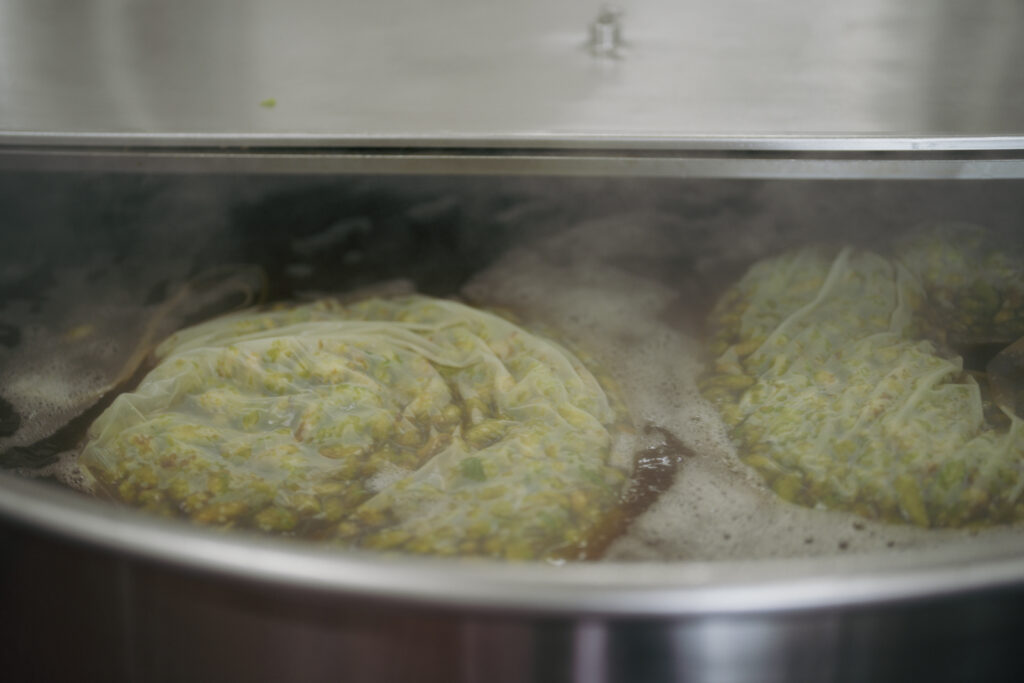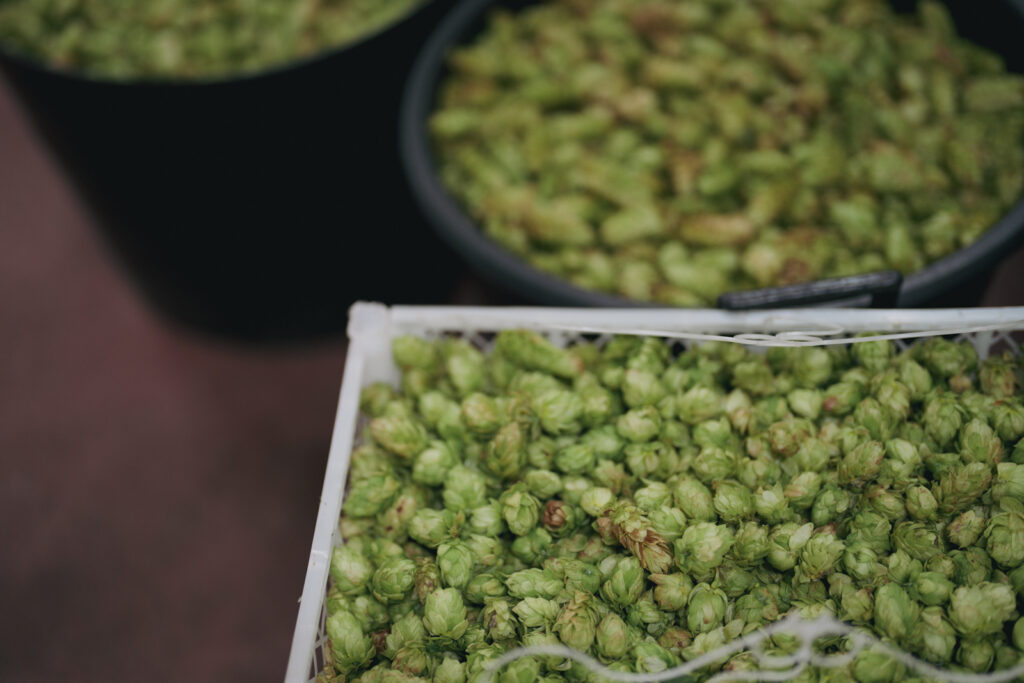Lose the Lederhosen — On Green Hopped Beers and The UK’s Appropriation of Oktoberfest
I’m a summer guy – anyone who knows me well enough will tell you that. I love sipping cold pints in sun-soaked beer gardens, watching the shadows crawl out from beneath you as the gloam of a warm summer’s evening slowly sets in. It’s my favourite time of the year.
And yet, despite the feeling of melancholy triggered by the gradual onset of colder days and shorter nights, there are elements of autumn I do look forward to. No, not pumpkin spice lattes. I’m talking about seasonal beers inspired by the onset of harvest and abundance: märzen, bock, mild, red ale, porter, and perhaps most of all, green hopped beers.
Although, unless you live relatively close to a hop producing region such as Kent, Sussex or Herefordshire, you’re unlikely to come across many of the latter. Green hopped beers – sometimes referred to as wet, or fresh hopped beers – are brewed using hops that have usually been harvested within 24 to 48 hours. They’re quite different to the majority of commercially used hops, which are typically dried, kilned, and in many cases processed into pellets, or what are known as ‘advanced hop products’ which includes things like hop extracts.

Unlike their processed counterparts, green hops still hold a significant amount of moisture, and you can easily break a fresh hop cone apart to find the sticky resins and essential oils within. Processing gives brewers easier access to these elements, and the crucial alpha acids that contribute to a beer’s inherent bitterness. As green hops have not been processed, a brewer needs to use around four to five times the volume in order to get a similar effect.
Another benefit of hops not being processed is that they offer different flavours and aromas than if they were. Goldings is a great example of this. When processed, it typically presents notes of white pepper, and maybe hedgerow fruits like blackberries. When used fresh, however, it imbues a beer with a zesty lemon character with herbal undertones, almost like nettle tea. The difference is actually quite remarkable, and demonstrates why some beer drinkers (myself included) get excited when green hop season comes around again.
I consider that green hop season is a special time in the UK beer calendar, one that if proper care and ownership was duly taken, would help connect drinkers to beer’s inherently agricultural nature. Centres within hop growing regions, such as the town of Faversham in Kent, celebrate this annually with festivals of green hopped beer that feature music, dancing, fancy dress, and plenty of revelry.

Unfortunately, events like this are largely seen as a bit old hat and, well, weird by outsiders. Morris Dancers don’t seem to have the same mystical cultural appeal as another seasonal beer event at which people dress in traditional costume. One that in recent years seems to have captured all aspects of the beer market, from the niche to the mainstream, by storm. When you look at the fact it features fancy dress, revelry and beers very much of the season, it actually doesn’t look too dissimilar to our own, far smaller scale green hop celebrations.
I am, of course, referring to Oktoberfest, an event which has cemented itself as a staple in the British beer calendar as Oktoberfest UK, both in the minds of drinkers, and the breweries who pander to it, instead of celebrating in their own agricultural heritage.
Oktoberfest is an annually held carnival and beer festival held in the city of Munich, in the southern German region of Bavaria. It takes place over the last two weeks of September, usually finishing on the first weekend of October, and is held in the Theresienwiese festival grounds on the west side of the city (although these days the locals usually refer to it as “d’Wiesn” as it’s less of a mouthful).
It was first held on October 12, 1810, to celebrate the marriage of the then crown prince of Bavaria (later King Louis I) to Princess Therese von Sachsen-Hildburghausen, whom the festival grounds are named in honour of. It has since grown exponentially and become a cultural phenomenon, not only to the residents of Bavaria (who practically treat it like a religious holiday) but worldwide, and it’s now attended by around 6 million people each year.
In 2016 I was one of those attendees and I can honestly say I have never experienced anything like quite it. I also consider that one visit was perhaps enough to last me a lifetime. First you must understand that Oktoberfest is not merely a celebration of beer, it is a carnival of music, merriment and gigantic fairground rides. Whole families visit to enjoy the atmosphere and gorge themselves on sausages, pork knuckle and apple strudel. Next you must also understand that Oktoberfest is all about the beer. Most people attend so they may spend time within the gargantuan beer tents, each one hosted exclusively by on the of the ‘big six’ Munich breweries: Hofbräuhaus, Löwenbräu, Augustinerbräu, Paulaner, Hacker-Pschorr and Spaten-Franziskaner.
It was in the Hacker-Pschorr tent where I spent most of my time there, merrily guzzling down litre maßkrugs (not steins, those are made of stone, not glass) of 6%-ish festbier, each one crowned with a mighty dome of snow-white foam, and occasionally accompanied by a not-unwelcome shot of schnapps. For me Oktoberfest felt like an exercise in both stamina and repetition; the maßkrugs keep coming whether you like it or not, and the band will rip into another rendition of fan favourite Ein Prosit at least every 15 minutes. Each time they do so, you stand on your bench, dance, yell prost and down a few more sips of beer amid the cacophony of a thousand clinking glasses.
Oktoberfest is also where I was handed what I would consider to be my worst ever hangover, and I’ve had a few, so this is really saying something. But it is truly an experience that every beer lover should have at least once, because the scale of the event is what makes it so awe-inspiring.
These days however, you don’t need to go to Munich to experience ‘Oktoberfest’. Come September, UK towns and cities are beset with copycat events where you can enjoy your maßkrugs of festbier locally, without having to endure Easyjet flight 2197 to Franz Josef Strauss Airport. This year it felt like Oktoberfest was everywhere I turned, with the blue and white chequered bunting of Bavaria hanging in nearly every pub and taproom I happened to frequent in late September. Even at-home drinkers weren’t spared from the fervour, rushing down to their local Lidl in order to pick up a conveniently bundled Oktoberfest gift set before it sold out.
I am not usually one to turn my nose up when people get this excited about beer; really, that’s a net positive. I am also very keen on the higher-in-alcohol, malt-forward lagers that emerge from both Germany, and many of the UKs small breweries around this time of year, as it truly is one of my favourite styles.
My worry, however, is about the scale at which Oktoberfest is now celebrated in the UK. I feel we’re reaching a point where we risk alienating our own, indigenous beer culture by instead appropriating that of another country. Although I don’t think the answer is in telling people they shouldn’t celebrate Oktoberfest and not drink lots of lovely lager to help usher in the autumn. There is plenty of room for both, with many UK-brewed green hop beers arriving after the first weekend of October, when Oktoberfest typically ends.
What I do see is potential. If people in the UK are able to get this excited about a very specific beer culture that originated in another country, then why should we not be able to get them as excited as our own. Green hop, or harvest beer festivals are already popular in other parts of the country, and I say it’s high time we rolled out the morris dancers and embraced our own beer traditions wholeheartedly. Lets lose the lederhosen and get kitted out in rag coats and clogs instead.

To achieve this we need green hopped beers to be adopted by more breweries in the UK, and then organise the events that help create the kind of excitement that resonates with drinkers, just like Oktoberfest already does. There’s a decent amount of evidence that this is something that’s starting to happen, too.
For the past few years London’s Five Points Brewery has been brewing a range of green hop beers, with the hops sourced directly from Hukins Hop Farm in Kent. It showcases these beers at its Hackney Pub, The Pembury Tavern, each October. In Manchester, Steve Dunkley at Beer Nouveau has for the past few years hosted a green hop brew day for homebrewers in South Manchester, many of whom have grown their own hops in their back gardens. While Beer Nouveau has recently had to cease brewing, it did manage to produce one final green hop beer, which will be available before it vacates its premises on Temperance Street at the end of October. Excitingly, there were enough locally-grown hops left over to brew another green hopped beer at nearby Track Brewing, which is also due to be released soon.
These are baby steps, but if the UK’s new wave of breweries can embrace green hop season and then celebrate it with the same attitude that they already do Oktoberfest then more drinkers undoubtedly will too. Even a little tweak of the wording, from Oktoberfest UK to Harvest Harvest Beer festival would make a lot more sense to me. Of course, there are already plenty of ways to celebrate this, such as the aforementioned Faversham Green Hop Festival. Perhaps to truly embrace green hop season we need to reframe our perception of these events, and lean hard into embracing these traditions, but nationwide, instead of merely in smaller communities.
I can’t shake the feeling that for all the time and energy breweries and venues spend investing in another country’s beer culture, that this would be better spent by celebrating what we grow here, at home. Hop harvest might have already passed us by this year, but that gives us plenty of time to think about how we might celebrate next year’s harvest, and get plenty of people excited about hops and their relationship to beer in the process.
— Matthew Curtis